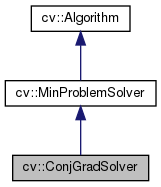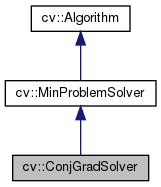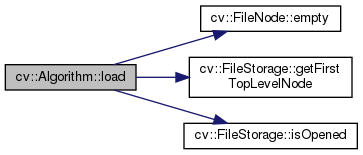This class is used to perform the non-linear non-constrained minimization of a function with known gradient,. More...
#include <opencv2/core/optim.hpp>


Public Member Functions | |
| virtual void | clear () |
| Clears the algorithm state. More... | |
| virtual bool | empty () const |
| Returns true if the Algorithm is empty (e.g. More... | |
| virtual String | getDefaultName () const |
| Returns the algorithm string identifier. More... | |
| virtual Ptr< Function > | getFunction () const =0 |
| Getter for the optimized function. More... | |
| virtual TermCriteria | getTermCriteria () const =0 |
| Getter for the previously set terminal criteria for this algorithm. More... | |
| virtual double | minimize (InputOutputArray x)=0 |
| actually runs the algorithm and performs the minimization. More... | |
| virtual void | read (const FileNode &fn) |
| Reads algorithm parameters from a file storage. More... | |
| virtual void | save (const String &filename) const |
| Saves the algorithm to a file. More... | |
| virtual void | setFunction (const Ptr< Function > &f)=0 |
| Setter for the optimized function. More... | |
| virtual void | setTermCriteria (const TermCriteria &termcrit)=0 |
| Set terminal criteria for solver. More... | |
| virtual void | write (FileStorage &fs) const |
| Stores algorithm parameters in a file storage. More... | |
| void | write (const Ptr< FileStorage > &fs, const String &name=String()) const |
| simplified API for language bindings This is an overloaded member function, provided for convenience. It differs from the above function only in what argument(s) it accepts. More... | |
Static Public Member Functions | |
| static Ptr< ConjGradSolver > | create (const Ptr< MinProblemSolver::Function > &f=Ptr< ConjGradSolver::Function >(), TermCriteria termcrit=TermCriteria(TermCriteria::MAX_ITER+TermCriteria::EPS, 5000, 0.000001)) |
| This function returns the reference to the ready-to-use ConjGradSolver object. More... | |
| template<typename _Tp > | |
| static Ptr< _Tp > | load (const String &filename, const String &objname=String()) |
| Loads algorithm from the file. More... | |
| template<typename _Tp > | |
| static Ptr< _Tp > | loadFromString (const String &strModel, const String &objname=String()) |
| Loads algorithm from a String. More... | |
| template<typename _Tp > | |
| static Ptr< _Tp > | read (const FileNode &fn) |
| Reads algorithm from the file node. More... | |
Protected Member Functions | |
| void | writeFormat (FileStorage &fs) const |
This class is used to perform the non-linear non-constrained minimization of a function with known gradient,.
defined on an n-dimensional Euclidean space, using the Nonlinear Conjugate Gradient method. The implementation was done based on the beautifully clear explanatory article [An Introduction to the Conjugate Gradient Method Without the Agonizing Pain](http://www.cs.cmu.edu/~quake-papers/painless-conjugate-gradient.pdf) by Jonathan Richard Shewchuk. The method can be seen as an adaptation of a standard Conjugate Gradient method (see, for example http://en.wikipedia.org/wiki/Conjugate_gradient_method) for numerically solving the systems of linear equations.
It should be noted, that this method, although deterministic, is rather a heuristic method and therefore may converge to a local minima, not necessary a global one. What is even more disastrous, most of its behaviour is ruled by gradient, therefore it essentially cannot distinguish between local minima and maxima. Therefore, if it starts sufficiently near to the local maximum, it may converge to it. Another obvious restriction is that it should be possible to compute the gradient of a function at any point, thus it is preferable to have analytic expression for gradient and computational burden should be born by the user.
The latter responsibility is accomplished via the getGradient method of a MinProblemSolver::Function interface (which represents function being optimized). This method takes point a point in n-dimensional space (first argument represents the array of coordinates of that point) and compute its gradient (it should be stored in the second argument as an array).
|
inlinevirtualinherited |
Clears the algorithm state.
Reimplemented in cv::FlannBasedMatcher, and cv::DescriptorMatcher.
|
static |
This function returns the reference to the ready-to-use ConjGradSolver object.
All the parameters are optional, so this procedure can be called even without parameters at all. In this case, the default values will be used. As default value for terminal criteria are the only sensible ones, MinProblemSolver::setFunction() should be called upon the obtained object, if the function was not given to create(). Otherwise, the two ways (submit it to create() or miss it out and call the MinProblemSolver::setFunction()) are absolutely equivalent (and will drop the same errors in the same way, should invalid input be detected).
| f | Pointer to the function that will be minimized, similarly to the one you submit via MinProblemSolver::setFunction. |
| termcrit | Terminal criteria to the algorithm, similarly to the one you submit via MinProblemSolver::setTermCriteria. |
|
inlinevirtualinherited |
Returns true if the Algorithm is empty (e.g.
in the very beginning or after unsuccessful read
Reimplemented in cv::DescriptorMatcher, cv::ml::StatModel, cv::Feature2D, and cv::BaseCascadeClassifier.
|
virtualinherited |
Returns the algorithm string identifier.
This string is used as top level xml/yml node tag when the object is saved to a file or string.
Reimplemented in cv::AKAZE, cv::KAZE, cv::SimpleBlobDetector, cv::GFTTDetector, cv::AgastFeatureDetector, cv::FastFeatureDetector, cv::MSER, cv::ORB, cv::BRISK, and cv::Feature2D.
Getter for the optimized function.
The optimized function is represented by Function interface, which requires derivatives to implement the calc(double*) and getDim() methods to evaluate the function.
|
pure virtualinherited |
Getter for the previously set terminal criteria for this algorithm.
|
inlinestaticinherited |
Loads algorithm from the file.
| filename | Name of the file to read. |
| objname | The optional name of the node to read (if empty, the first top-level node will be used) |
This is static template method of Algorithm. It's usage is following (in the case of SVM):
In order to make this method work, the derived class must overwrite Algorithm::read(const FileNode& fn).
References CV_Assert, cv::FileNode::empty(), cv::FileStorage::getFirstTopLevelNode(), cv::FileStorage::isOpened(), and cv::FileStorage::READ.

|
inlinestaticinherited |
Loads algorithm from a String.
| strModel | The string variable containing the model you want to load. |
| objname | The optional name of the node to read (if empty, the first top-level node will be used) |
This is static template method of Algorithm. It's usage is following (in the case of SVM):
References CV_WRAP, cv::FileNode::empty(), cv::FileStorage::getFirstTopLevelNode(), cv::FileStorage::MEMORY, and cv::FileStorage::READ.

|
pure virtualinherited |
actually runs the algorithm and performs the minimization.
The sole input parameter determines the centroid of the starting simplex (roughly, it tells where to start), all the others (terminal criteria, initial step, function to be minimized) are supposed to be set via the setters before the call to this method or the default values (not always sensible) will be used.
| x | The initial point, that will become a centroid of an initial simplex. After the algorithm will terminate, it will be set to the point where the algorithm stops, the point of possible minimum. |
|
inlinevirtualinherited |
Reads algorithm parameters from a file storage.
Reimplemented in cv::FlannBasedMatcher, cv::DescriptorMatcher, and cv::Feature2D.
|
inlinestaticinherited |
Reads algorithm from the file node.
This is static template method of Algorithm. It's usage is following (in the case of SVM):
In order to make this method work, the derived class must overwrite Algorithm::read(const FileNode& fn) and also have static create() method without parameters (or with all the optional parameters)
|
virtualinherited |
Saves the algorithm to a file.
In order to make this method work, the derived class must implement Algorithm::write(FileStorage& fs).
Setter for the optimized function.
It should be called at least once before the call to* minimize(), as default value is not usable.
| f | The new function to optimize. |
|
pure virtualinherited |
Set terminal criteria for solver.
This method is not necessary to be called before the first call to minimize(), as the default value is sensible.
Algorithm stops when the number of function evaluations done exceeds termcrit.maxCount, when the function values at the vertices of simplex are within termcrit.epsilon range or simplex becomes so small that it can enclosed in a box with termcrit.epsilon sides, whatever comes first.
| termcrit | Terminal criteria to be used, represented as cv::TermCriteria structure. |
|
inlinevirtualinherited |
Stores algorithm parameters in a file storage.
Reimplemented in cv::FlannBasedMatcher, cv::DescriptorMatcher, and cv::Feature2D.
References CV_WRAP.
Referenced by cv::Feature2D::write(), and cv::DescriptorMatcher::write().

|
inherited |
simplified API for language bindings This is an overloaded member function, provided for convenience. It differs from the above function only in what argument(s) it accepts.
|
protectedinherited |